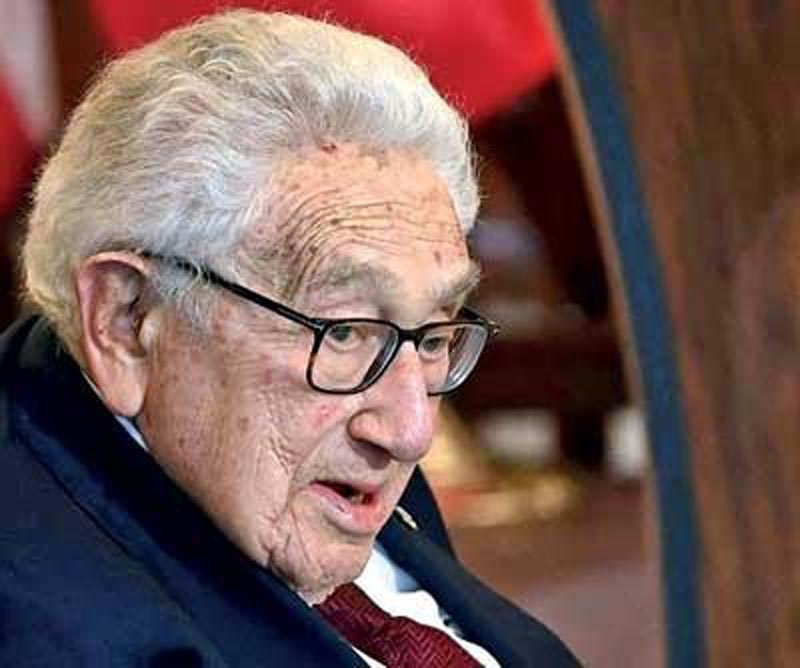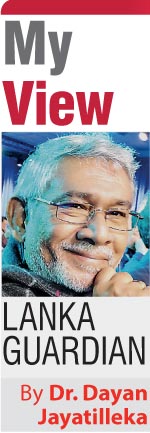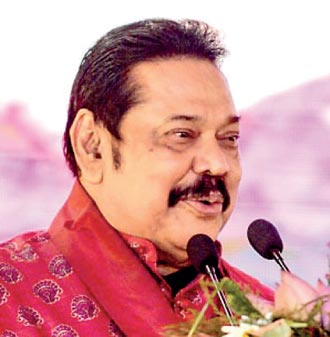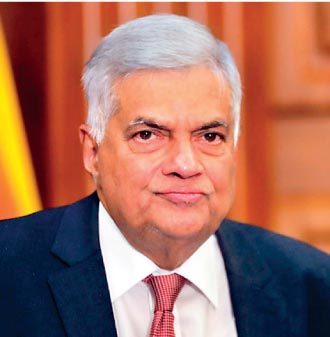Tuesday Feb 17, 2026
Tuesday Feb 17, 2026
Thursday, 7 December 2023 00:30 - - {{hitsCtrl.values.hits}}

The last maestro
 Who gave President Wickremesinghe a mandate for “radical restructuring”, rather than stabilisation, of the economy? The SLPP, elected on a diametrically different platform?
Who gave President Wickremesinghe a mandate for “radical restructuring”, rather than stabilisation, of the economy? The SLPP, elected on a diametrically different platform?
Though the Presidential election is due in Sept-Oct 2024 and should be the preeminent political preoccupation as in the USA, the main Opposition urges a snap parliamentary election. Why?
It argues that Wickremesinghe is implementing an economic program, the strategic direction of which the Opposition’s prominent economic policy-makers are in agreement, but is doing so without “a team” ideologically committed to the task. Ranil’s SLPP ally has a history of hostility to economic liberalism, the SJB cautions.
The implication is that an ideologically compatible ‘team’, i.e., Ranil’s 2015-2019 crew, could be put in place through a snap parliamentary election which will flush-out the SLPP and presumably produce an SJB majority. The coded messaging is that this could swing support within the SJB for a Ranil-Sajith ticket with the incumbent as candidate.
Crisis causation
Getting the band back together is a terrible thought. Ranil’s policies of 2015-2019, stridently defended by the main Opposition’s economists who participated in it during Yahapalanaya, and with which their ‘Economic Blueprint’ is on a clear continuum, actively caused the current economic crisis and remains its most intractable component.
Neither the Pres-ident nor Opposition economists have picked up the gauntlet that Mahinda Rajapaksa recently threw down. (https://www.ft.lk/front-page/MR-speaks-out-on-origins-of-Sri-Lanka-s-economic-crisis/44-755704)
Mahinda empirically establishes his economic record as one of conspicuous success, hardly the cause of crisis or collapse:
 ‘Central Bank reports will show that during my nine years as President, economic growth averaged 6% a year during the four war years from 2006 to 2009.
‘Central Bank reports will show that during my nine years as President, economic growth averaged 6% a year during the four war years from 2006 to 2009.
 This increased to 6.8% in the five post-war years from 2010 to 2014.
This increased to 6.8% in the five post-war years from 2010 to 2014.
 Hence Sri Lanka’s per capita GDP increased threefold from $ 1,242 at the end of 2005 to $ 3,819 by the end of 2014.
Hence Sri Lanka’s per capita GDP increased threefold from $ 1,242 at the end of 2005 to $ 3,819 by the end of 2014.
 The debt to GDP ratio was a very healthy 69% at the end of 2014 having been brought down from 90% at the end of 2005.
The debt to GDP ratio was a very healthy 69% at the end of 2014 having been brought down from 90% at the end of 2005.
 The IMF Country Report No. 14/285 of September 2014 stated firstly, that Sri Lanka’s “Macroeconomic performance has generally exceeded expectations.” Secondly, that “Sri Lanka has made notable advances in recent years, and appears to be on its way to joining the ranks of upper middle-income countries.” Thirdly, “Sri Lanka’s economic growth has been among the fastest in Asia’s frontier and developing economies in recent years.”
The IMF Country Report No. 14/285 of September 2014 stated firstly, that Sri Lanka’s “Macroeconomic performance has generally exceeded expectations.” Secondly, that “Sri Lanka has made notable advances in recent years, and appears to be on its way to joining the ranks of upper middle-income countries.” Thirdly, “Sri Lanka’s economic growth has been among the fastest in Asia’s frontier and developing economies in recent years.”
Demolishing the myth of successful UNP (2015-2019) economic policies, MR captures the vertical drop:
 ‘The economic growth rate dropped to 4.2% in 2015 and ended up in the negative range at 0.2% below zero by 2019.
‘The economic growth rate dropped to 4.2% in 2015 and ended up in the negative range at 0.2% below zero by 2019.
 Sri Lanka’s total outstanding external debt had increased by nearly 28% from $ 42,914 million at the end of 2014, to $ 54,811 million by the end of 2019.
Sri Lanka’s total outstanding external debt had increased by nearly 28% from $ 42,914 million at the end of 2014, to $ 54,811 million by the end of 2019.
 The debt to GDP ratio which had been brought down to 69% by the end of 2014, had increased to nearly 82% by the end of 2019.
The debt to GDP ratio which had been brought down to 69% by the end of 2014, had increased to nearly 82% by the end of 2019.
 During the entire five-year period from 2015 to 2019 the average price of crude oil was $ 60 per barrel, the lowest in recent history.
During the entire five-year period from 2015 to 2019 the average price of crude oil was $ 60 per barrel, the lowest in recent history.
 There were no external reasons for Sri Lanka’s economic decline between 2015 and 2019. India and Bangladesh experienced average growth rates in excess of 7% and the Maldives over 6% during this period.
There were no external reasons for Sri Lanka’s economic decline between 2015 and 2019. India and Bangladesh experienced average growth rates in excess of 7% and the Maldives over 6% during this period.
 However, Sri Lanka’s average growth rate between 2015 and 2019 was just 3.5%, equal to the growth rate recorded in 2021 at the height of the pandemic.’
However, Sri Lanka’s average growth rate between 2015 and 2019 was just 3.5%, equal to the growth rate recorded in 2021 at the height of the pandemic.’
He lights-up the UNP’s ISB addiction which contributed decisively to the debt crisis, but is never criticised and is often defended by the SJB’s chief economist:
 ‘The accumulation of foreign commercial debt between 2015 and 2019 particularly in the form of International Sovereign Bonds (ISBs) was by far the worst disaster to befall us during that period.
‘The accumulation of foreign commercial debt between 2015 and 2019 particularly in the form of International Sovereign Bonds (ISBs) was by far the worst disaster to befall us during that period.
 In January 2015, outstanding ISBs amounted to $ 5,000 million and it was amply covered by our foreign reserves of $ 8,208 million.
In January 2015, outstanding ISBs amounted to $ 5,000 million and it was amply covered by our foreign reserves of $ 8,208 million.
 However, between 2015 and 2019 outstanding ISBs increased threefold to $ 15,050 with borrowings of $ 2,150 million in 2015, $ 1,500 million in 2016, $ 1,500 million in 2017, $ 2,500 million in 2018 and $ 4,400 million in 2019.
However, between 2015 and 2019 outstanding ISBs increased threefold to $ 15,050 with borrowings of $ 2,150 million in 2015, $ 1,500 million in 2016, $ 1,500 million in 2017, $ 2,500 million in 2018 and $ 4,400 million in 2019.
 Of this, $ 2,000 million was used to rollover ISBs taken during my tenure, thus the total amount in new ISB’s issued between 2015 and 2019 is $ 10,050 million.
Of this, $ 2,000 million was used to rollover ISBs taken during my tenure, thus the total amount in new ISB’s issued between 2015 and 2019 is $ 10,050 million.
 Despite the build-up of the stock of outstanding ISBs to $ 15,050, Sri Lanka’s total foreign reserves was just $ 7,642 million at the end of 2019.’
Despite the build-up of the stock of outstanding ISBs to $ 15,050, Sri Lanka’s total foreign reserves was just $ 7,642 million at the end of 2019.’
MR concludes with a strident reassertion of a successful record and the ‘very healthy’ economy he handed the UNP in 2015:
 “The per capita GDP is the most fundamental economic indicator used to judge the economic situation of a country and the contribution of my 2006-2014 government to increasing Sri Lanka’s per capita GDP is more than double that of all other post-independence Governments from 1948 to 2005 put together…”
“The per capita GDP is the most fundamental economic indicator used to judge the economic situation of a country and the contribution of my 2006-2014 government to increasing Sri Lanka’s per capita GDP is more than double that of all other post-independence Governments from 1948 to 2005 put together…”
Ranil and his 2015-2019 UNP economic team were ISB junkies who crashed the economy. As Opposition policy-makers, they remain unrepentant.
 |
| Knocks-out economic critics |
 |
| Policies caused crisis
|
Comprehending Kissinger
The responses to Henry Kissinger’s death at 100, proves that if a person’s contribution to his/her field is sufficiently significant, he or she will, on balance, be regarded positively as having made a lasting mark within that field, whatever the horrors he/she may have been responsible for along the way. Kissinger was the last great Realist thinker-practitioner in the fields of foreign policy and diplomacy. Viewed from the standpoint of ethics and morality, his crimes outweighed his constructive contribution, but from a Realist perspective, the evaluation is the reverse.
Kissinger’s crimes took place in the global South, from Vietnam, Cambodia and Indonesia to Chile and Angola. His constructive contribution took place in the classic zone of Realism: the relationship between Great Powers.
Like his hero and object of study, Metternich, Henry Kissinger grappled with restoring and maintaining the world order in an era of world revolution (from Vietnam through France to Angola). Unlike Metternich he did so in a nuclear age. How to avoid nuclear war in a revolutionary time, was his central problematique.
He did so with his new ‘concert of powers’ between the besieged USA, the USSR and China. He not only forged such a relationship at the side of Richard Nixon, a highly intelligent but morally vacuous leader, he did so in a manner that further divided America’s competitors while bringing each closer to the USA than to each other.
While I hardly share his vision and values, it would be a-historical not to concede his grand-strategic success after and despite a huge strategic defeat and retreat. Kissinger and Nixon escalated the bombing campaign of North Vietnam, Cambodia and Laos, in order to drive Hanoi to the negotiating table and obtain what he called “peace with honour”; the time and space for a dignified US withdrawal from Vietnam in the hope that the ‘Vietnamization’ campaign of shoring up South Vietnam’s military would pay-off. That gamble failed. But the relationship Kissinger had built with Russia and China and the exacerbation of the contradictions between the two Communist-run giants, ‘contained’ i.e., limited the effects of that failure and saved a US global leadership at the tipping-point.
Certainly, the North came to the negotiating table in Paris, and Kissinger and his Communist counterpart Le Duc Tho were nominated for the Nobel Peace Prize for arriving at an agreement. Kissinger accepted, but veteran revolutionary Le Duc Tho declined the Peace Prize with characteristic clarity, dignity and determination, declaring: “so long as imperialism exists, so will wars”.
Though the iconic Ho Chi Minh had died in 1969, his successors and proteges Le Duan, Vo Nguyen Giap, Pham Van Dong et al, out-thought and out-fought the Americans, launching an offensive in 1975, culminating in the unforgettable sight of a North Vietnamese tank putting its gun-barrel through the gates of the Presidential Palace in South Vietnam, busting open and rolling over the gates. US troops clung to the last helicopters leaving Saigon, ignominiously kicking-off their South Vietnamese clients who were clinging to the skids of the choppers. It was an indelible sight. Kissinger’s Vietnam strategy had conspicuously, failed.
John Stockwell, head of the CIA’s Angola Task Force wrote in his memoir ‘In Search of Enemies’ that Kissinger encouraged apartheid South Africa to intervene to stop the leftist MPLA led by poet and physician Dr. Agostino Neto, from assuming power in Angola when a leftwing military administration had assumed power in Portugal, the colonial power. The South Africans went in but when they were within sight of the capital Luanda, Fidel Castro from across the Atlantic decided to massively reinforce the Cuban military mission that was helping the MPLA. Cuba fought the mighty (nuclear-armed) South Africans for 12 years, crowning their effort with a decisive military victory in Cuito Cuenevale in 1988, which as Nelson Mandela often said, opened the prison gates to him, and the door to the fall of apartheid.
On Kissinger’s watch and probably with his co-authorship, Latin America had been the site of the horrendous Operation Condor: the coordinated renditioning and ‘disappearing’ of young radical activists by the region’s military juntas. Before that decade of the 1970s ended, history hit back with the victory of the leftwing Sandinista revolution in Nicaragua in 1979.
The Sandinista victory came months after a strategically far more crucial defeat of Kissinger’s grand plan. To shore up a teetering US hegemony in a changing global order, he had built up regional ‘sub-systems’ dominated by sub-superpowers. Iran under the Shah of Iran was the exemplar of this strategy. In 1979, the Iranian people led by Ayatollah Khomeini overthrew the man they branded ‘the American Shah’, in a revolution which has remained anti-imperialist in orientation to this day.
Just when it looked like Dr Kissinger had failed in his project to contain and manage the global revolutionary dynamics of his time, Deng Xiaoping’s China made a shocking incursion into North Vietnam. The incursion was beaten back but the whole global game changed. The Sino-Soviet Cold War became the most intense rivalry in world politics, blocking, countervailing and reversing the global revolutionary current on every one of the three continents of the ‘Tricontinental’ world, and in Europe (Portugal) as well. I have tracked this in one of my books (https://www.kriso.ee/fall-global-socialism-counter-narrative-from-db-2016021100839.html?lang=eng).
The Sino-Soviet conflict antedated the Kissinger-Nixon opening to China (a border skirmish in 1969 involved heavy-weapons), but what was new in the late 1970s and through the 1980s was the US-China quasi-alliance. That was the decisive factor causing the retardation, disintegration and reversal of the world revolutionary dynamic. That quasi-alliance would not have been possible without Kissinger’s China policy.
I recall the mood in the US policy elite after Vietnam, because in 1975 I was with my parents at the symposium on ‘US Foreign Policy After Vietnam’ at the Wingspread conference center near Lake Michigan, Wisconsin, designed by Frank Lloyd Wright. Paper presenters included Ray Cline, iconic former Deputy Director of the CIA, Kenneth Myers of Georgetown’s CSIS, and my father Mervyn de Silva among others. I still recall the Soviet academician addressing the conference from his comfort zone of “high détente” and informing the audience that the Portuguese Communists, the Cubans, and other leftists on the offensive throughout the Third World were adherents of “early Leninism”, by which he meant with wry condescension, that they weren’t mature pragmatists as were the Soviet Communists.
At the most crucial moment for the USA in world history, in the wake of the defeat in Vietnam and a string of defeats in Angola, Mozambique, Guinea-Bissau, Iran and Nicaragua symbolizing the initiative held by anti-imperialist forces, the strength and sagacity of Kissinger’s architecture of Great Power relations kicked-in to check and then turn the tide. Zbigniew Brzezinski’s Afghanistan entrapment of the USSR was possible only because of the US rapprochement with China.
What Kissinger demonstrates is that if you have a sound grasp of concepts and history which give you a mastery of the fundamentals of your field, you can make up for the losses that flow from processes beyond your control as well as from your own mistakes, and your main contribution will save your project in the longer term. The fundamentals in Kissinger’s field were not ethics and morality, but the relations of power among states-- or more correctly the relations among the Great Powers—and he got those more right than wrong, from the standpoint of US interests.
His Metternichian ‘concert of powers’ between the USA-Russia-China, held the line, thwarting the changed correlation of forces between revolution and the Empire as seen in the victory of Vietnam and its aftermath. Though he lost in Vietnam and the global South, he succeeded in what mattered to him and his nation most, and at the time it mattered most: containing the revolutionary currents of his –and our—time.
It was not easy for Kissinger to push through the policies of détente with Russia and opening to China, because the Republican party was steeped in anti-Communist ideology which saw no difference between Russia and China, and if there was a difference, was certain that China, which had fought the US in Korea was the worst of the two. Kissinger’s lucid mind was able to see that a new course was necessary for US national interest to be best served at a time when extrication from Vietnam and the management of the world order at a time of revolutionary upheaval, was the overriding imperative.
Kissinger’s achievement was dismantled and Russia and China brought together as the unintended result of overassertive US policy. He was increasingly ignored by the foreign policy intelligentsia. Wary of the possibility of a clash between nuclear-armed protagonists NATO and Russia over Ukraine, he urged the neutrality of Ukraine and a negotiated settlement which he predicted would have to leave Russia with Crimea and much (but not all) of what it had taken of Donbass. Nobody in Washington or the collective West listened.
What gave Kissinger his stature was not only his practical achievement but his standing as a thinker whose concepts preceded his practice and whose practice was informed by his conceptual grasp. Even though the Kissingerian architecture of Great Power relations lies in rubble, having been destroyed by unilateralist US administrations—ironically by administrations of the US Republican party he had been associated with—his reputation was ever more firmly established by his thinking, manifested in a succession of lucid, learned and elegantly-executed books.
The universe of thought, foreign policy and ‘world strategy’ (his last book was ‘Leadership: Six Studies in World Strategy’) will miss him. His absence from the realm of thinking-through global politics and the world order-- world affairs-- will be almost impossible to fill.
It is as a thinker-practitioner, who late in life assumed sage-like status, displaying insights definable as wisdom, that we mourn the loss of Dr. Kissinger. In his domain, Henry Kissinger was a maestro. There is no other on the horizon.